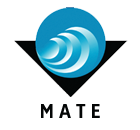
MATE Summer Institutes: 2014 SessionS Will be posted by January 1, 2014.
The 2014 MATE Center Summer Institutes are designed to:
- Introduce educators to Underwater Robotics (beginner session)
- Introduce educators with limited Underwater Robotics experience to the knowledge and skills needed to step up from a simple, on-off switch box control system to a control system that allows for motor speed control. The workshop will focus on building a four-motor ROV using bi-directional speed controllers to operate each motor. Workshops will be in July 2014, exact dates will be posted by January 1, 2014.
Other activities will include a look at basic plug and play sensors and using simple hand-powered pneumatics to create a functional manipulator. The target audience for the 2014 MATE Center Summer Institute is faculty and educators who have experience building and teaching simple switch box controllers that are interested in upgrading their skills to build a slightly more sophisticated motor control system.
Workshop topics that will be covered include:
-
Introduction to electronics (H-bridges, resistors, potentiometers & variable resistors, diodes, capacitors and semi-conductors).
-
How to use pulse-width modulation to control speed.
-
How to solder through-hole components, including integrated circuits.
-
How to construct a K-166 bi-directional motor speed controller.
-
Overview of how the K-166 works.
-
How to modify the K-166 to work with joysticks.
-
How to use LEDs to monitor for potential leaks, power status, and motor control functionality.
-
Why your LED needs a resistor.
-
How to calculate the perfect resistor for your LED.
-
A comparison of four motor configurations.
-
Why you may or may not want to use a computer based system.
-
Introduction to a simple computer-based control system.
-
How to design and build a functional manipulator using hand-powered syringe pneumatics.
-
How to waterproof and use basic sensors.
Each summer, the MATE Center hosts Summer Institutes for Faculty Development, week-long professional development workshops for college, high school, and university faculty. The purpose of the institutes is to:
- Create an awareness of ocean activities related to marine research, exploration, and industry
- Highlight ocean-related career opportunities
- Promote the teaching of higher-level technical, problem-solving, critical thinking, communication, and teamwork skills
- Provide opportunities for educators and employers to interact
| Institutes topics vary from year to year. Past topics have included submersible technology, marine technology, and the marine applications of GIS. The level of instruction ranges from introductory to advanced. Since 1999, more than 500 educators from 200 schools in 30 states have participated in MATE's Summer Institutes. They have used the knowledge they gained to create new courses, modify existing courses, and organize club activities focused on marine technology. Curriculum products, including lesson plans and projects, that were created by past participants can be found in the archive |




